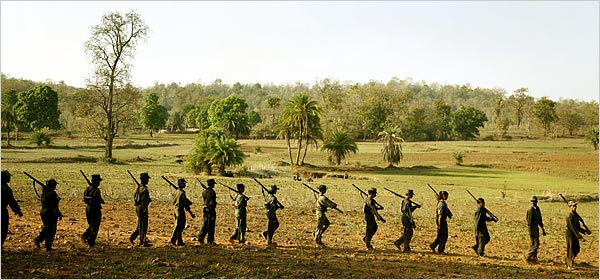Agreements made between corporations and governments on natural resource extraction go further than economic ties, as they fundamentally affect the lives of the local people that live on the land. Corporate land grabs undermine the livelihood of farmers across the developing world, as the corporations take the land they live off of for the resources that lie beneath it. While this problem sheds light on the significant challenges of a fossil-fuel dependent global system, no community has responded quite like the Maoists of India.
The Maoists are currently considered the greatest current internal security threat to India. Also known as the Naxalites, the Maoists are some of the poorest members of society and have consistently been displaced from their land due to the Indian government’s quest for natural resources. Consisting of roughly 40,000 members and representing 21 out of the 28 states of India, they have created a guerilla army to fight for the rights of the poor people in India.
Their aim is to empower the landless peasants of India through a violent overthrow of the State. They employ child soldiers to gather intelligence, plant bombs, landmines, and fight with government security forces. They demand food and shelter at gunpoint, and force people to join their army. They bomb schools, highjack trains, and behead police officers, all to undermine government hegemony.
On May 25 the Maoists attacked the Congress Party leaders of Chhattisgard, killing at least 27 members, including 3 members of the Indian National Congress Party.
While the Maoists are trying to draw attention to the desperation of the matter, their violence is unfounded. The violence is unconstructive and only abusing the rights of more innocent civilians. Are acts of violence the only way that Maoists feel their movement will be heard?
The Indian government has consistently responded to Maoists with an aggressive counter-insurgency plan, known as the Operation Green Hunt (OGH). The campaign pursued by the Indian government imposes strict draconian laws that contradict the freedoms of a democratic society. Any activist that speaks out on the inequities existing in India is presumed to be associated with the Maoists. According to Human Rights Watch, government forces will arrest villagers if there is any suspicion that they are Maoist supporters.
As a result, the battle between the government and the Maoists is even further exacerbated. If the Maoists suspect anyone to be a government informer, they send the suspect to the Maoist court system, known as the jan adalats. These jan adalats do not meet any international standards of impartiality or access to defense, and often those prosecuted are beheaded or shot. Activists are caught between these two enemies and their democratic values are repressed.
The Maoists must find other ways to communicate because terrorism and instilling fear in a population is not a viable solution as it only paralyzes a nation. The Maoists have no justification for their violence, as there are other more peaceful ways to communicate.
It is unfortunate that attention must be drawn to this problem through violence, however without further antagonizing the Maoist community, the Indian government must address the problem at hand. Taking land away from the farmers strips them of their identity and livelihood and the landowners deserve justice for their land. The government must begin to prioritize the needs of these communities over the economic incentives.
 Log in
Log in









